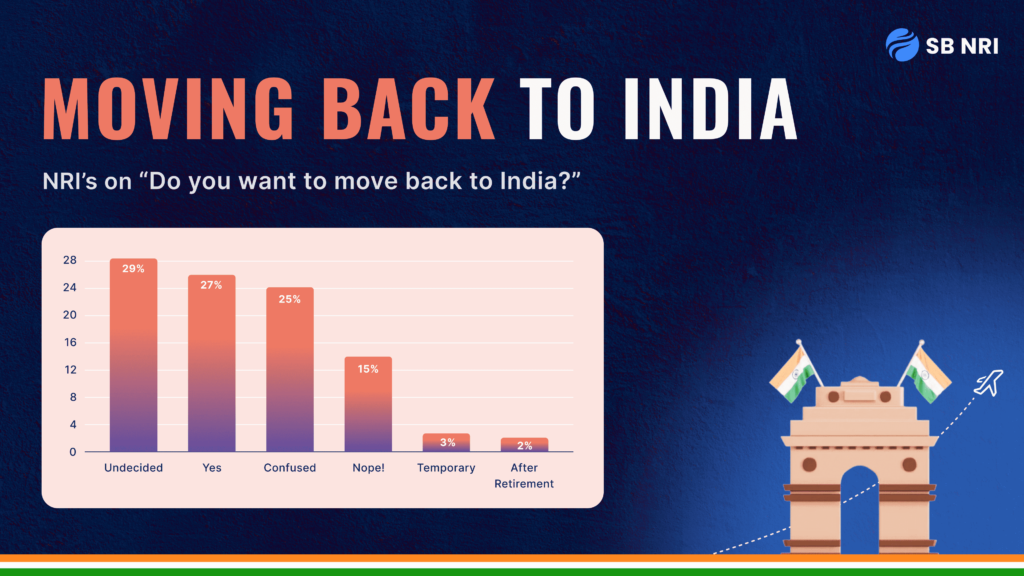
“Ghar kab wapas aaoge?” A question that echoes with longing and emotion, often uttered by mothers waiting for their children to return home. But what if this call is not just from family but from the motherland itself? Is the sentiment different, or same calling to come back home? As India rises on the global economic stage, this question gains even more significance for Non-Resident Indians (NRIs) and Overseas Citizens of India (OCIs) planning a return. Discover the ins and outs of moving back to India for India in this blog. From economic opportunities to tax implications, we explore the factors influencing NRIs’ decisions.
Indian Economy: Present and Future
Goldman Sachs predicts that India will become the world’s second-largest economy by 2075. Martin Wolf suggests that India’s purchasing power could surpass that of the United States by 2050. These predictions paint a picture of a prosperous future, not just for India but also for its citizens, including NRIs and OCIs.
Recent reports highlight a significant vote of confidence from global investors. Bloomberg noted that global funds are increasingly betting on India’s longer-maturity bonds, with overseas funds now holding 17% of such debt. This trend indicates a strong belief in the stability and potential of the Indian economy.
Morgan Stanley positions India as the most preferred emerging market. According to the IMF’s estimates, India is on track to become the fourth-largest economy by 2026, surpassing Japan, and to overtake Germany as the third-largest economy by 2027, with a GDP exceeding $5 trillion. As aforementioned, RBI has already projected the growth for the upcoming two fiscal years at 6.5%, this bodes well for the growth of the Indian economy. For NRIs, this economic ascent offers both pride and opportunity if you’re planning for moving back to India.
Also read: Best NRI Investments in India: Top 10 Investment Options for NRIs/OCIs in India 2024
Who is an NRI?
Indian Citizens who have gone out or are staying abroad for employment, business, or vocation (occupation for which an individual is trained) or for some other purpose to stay outside India for an uncertain period are also termed as NRIs. [definition as per Foreign Exchange Management Act (FEMA)]
An NRI or Non-Resident Indian is an Indian Citizen living outside India for a minimum of 183 days in 1 financial year (definition as per Income Tax Act)

NRIs: The Unsung Heroes of Economic Upliftment
The contributions of NRIs to India’s economy are significant yet often overlooked. From investments in mutual funds and real estate to substantial flows into NRI deposits, their impact is immense. Despite facing challenges like NRI Mutual Fund KYC issues with mutual funds, NRIs remain optimistic and continue to invest in India’s growth and are hopeful of moving back to India.
Also read: How to check or verify your Mutual Fund KYC Status: Step-by-Step Guide
Pros and Cons of Coming Back to India for NRIs
Pros:
- Economic Opportunities: Booming economy with growing job prospects and business opportunities.
- Cultural Reconnection: Reconnect with family, traditions, and cultural heritage.
- Cost of Living: Often lower cost of living compared to many Western countries.
- Growing Infrastructure: Improvements in infrastructure, healthcare, and education.
- Community Support: Strong sense of community and support networks.
Cons:
- Bureaucracy: Potentially dealing with bureaucratic red tape.
- Pollution and Traffic: Challenges with pollution, traffic, and urban congestion in major cities.
- Quality of Life: Differences in quality of life standards compared to Western countries.
- Education System: Adjustments required for children’s education, which may differ from international standards.
- Job Market: Competition in the job market and potential lower salaries compared to abroad.
Taxation Rules for NRIs and OCIs

Taxation rules for NRIs and OCIs are designed to differentiate between income earned within India and income earned abroad. NRIs are only liable to pay taxes on income that is earned or accrued in India, such as salary received in India, income from property situated in India, or investments made in Indian assets. Foreign income earned by NRIs is generally exempt from Indian taxes.
However, upon returning to India, NRIs may initially qualify for RNOR (Resident but Not Ordinarily Resident) status for up to 3 years, during which their foreign income remains non-taxable, similar to their NRI status. After this period, they transition to ROR (Resident and Ordinarily Resident) status, where their global income, including foreign earnings, becomes taxable under Indian income tax laws.
Also Read: Income Tax e-filing: Top 10 NRI Income Tax Filing Benefits
The Emotional Pull: Home Calling for NRIs
For many NRIs, the decision to move abroad was driven by the search for better opportunities. However, the emotional connection to India remains strong. Events like the 2024 ICC Cricket World Cup in India saw thousands of NRIs returning, albeit temporarily, to cheer for their home team. This sense of belonging and pride underscores the enduring bond they have with their homeland.
Also read: NRI Returning to India: Top 3 Tips 2024
The Prodigal Return: Will NRIs/OCIs Come Back?
The question remains: will NRIs return to India for good? The answer lies in a complex interplay of factors including retirement plans, children’s education, marriage prospects, and the future potential of the Indian economy.
The call to move back to India is both an emotional and economic consideration. With India poised for significant growth, the country offers a promising future for its returning citizens. Whether driven by a sense of duty, opportunity, or nostalgia, moving back to India is a tale of reconnecting with roots and contributing to the nation’s progress.
Read more in our exclusive report on “Moving Back to India,” where we delve into detailed aspects of this transition, covering retirement, education, marriage, and the future potential for NRIs.
Start your Investing Journey as an NRI in India with SBNRI
NRIs can now download the SBNRI App and choose to invest in different investment options in India with ease. You can also get detailed investment advice from experts at SBNRI. Also, visit our blog and YouTube channel for more details.
SBNRI is an authorized Mutual Fund Distributor platform & registered with the Association of Mutual Funds in India (AMFI). ARN No. 246671. NRIs willing to invest in mutual funds in India can download the SBNRI App to choose from 2,000+ mutual fund schemes or can connect with the SBNRI wealth team to better understand Mutual Fund investments.
FAQs
What are the tax implications of NRI moving back to India?
An NRI is exempt from paying taxes on income earned outside of India. However, when an NRI returns to India, they initially receive NOR (Non-Ordinary Resident) status, which eventually changes to ROR (Resident and Ordinarily Resident) status. As a resident of India, one is required to pay taxes on their global income under the income tax laws.
Is it good to go back to India from the USA?
Whether it is good to move back to India from the USA depends on individual circumstances. Factors to consider include career opportunities, lifestyle preferences, family ties, cost of living, and long-term goals. India offers a rapidly growing economy, cultural richness, and the comfort of being close to family, while the USA might offer better infrastructure, higher salaries, and diverse opportunities. Evaluate your priorities and make a decision that aligns with your personal and professional aspirations.
What is the penalty for not declaring NRI status?
Failure to declare NRI status can lead to penalties from the Indian tax authorities. The specific penalties may include fines and interest on unpaid taxes. Additionally, there may be legal consequences for not complying with tax regulations, which could include prosecution under the Income Tax Act.
How much foreign income is tax free in India for NRI?
Foreign income earned by an NRI is generally tax-free in India. However, once an NRI returns to India and changes their status to Resident and Ordinarily Resident (ROR), they are required to pay tax on their global income, including foreign income. The tax laws and exemptions can vary, so it is advisable to consult with a tax professional to understand specific obligations.
Is it worth moving to the USA from India in 2024?
Deciding whether to move to the USA from India in 2024 depends on individual goals and circumstances. The USA may offer higher salaries, advanced infrastructure, and diverse career opportunities. However, consider factors such as visa regulations, cost of living, cultural differences, and long-term career prospects. Research and weigh the pros and cons carefully to determine if the move aligns with your personal and professional objectives.
How long can I maintain NRI status after returning to India?
For RNORs returning to India, they can retain their RNOR status for up to 3 years after their return. During this period, any income earned in India will be taxable, while income earned abroad will not be taxable, similar to the tax treatment for NRIs, for those 3 years post-return.
What is the 4 year rule of NRI?
An individual is considered an NRI under the Income Tax Act if they have been in India for fewer than 182 days in the preceding financial year, or if they have been in India for fewer than 60 days during the previous year and 365 days or less over the past four years.
What is the 182 days rule for NRI?
NRI can stay in India for more than 182 days during a financial year. However, doing so will change their residential status from NRI to resident. In other words, to retain NRI status, an individual must stay in India for fewer than 182 days in a financial year.
What is the 240 days rule for NRI?
The 240 days rule for NRI refers to a provision introduced in the Finance Act 2020. According to this rule, an individual will be considered an NRI if they stay in India for 240 days or less during a financial year, provided they also meet certain other conditions related to previous years’ stays in India. This amendment was made to provide more clarity and flexibility for determining NRI status, ensuring that individuals who spend a significant portion of the year outside India are not taxed as residents.



